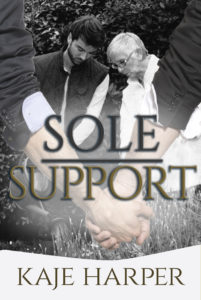I’ve been thinking, lately, about how much right I have, as an author, to put real life experiences on the pages of fiction. Even my own personal experiences sometimes involve someone else. Like that day I met a friend for the first time, and totally misjudged them, and embarrassed both of us? Is that legitimate fodder for a story, if I just change the names? What about that funny thing my kid did when they were seven? Can I give that to a fictional child? After all, no one but my kid and I will ever know it really happened to them.
More deeply, what about basing a character in a book on someone in real life? When is that okay? Or not? It’s something I’ve only really done once. 
In the next couple of weeks, I’ll be rereleasing my third Samhain novel, Sole Support. This is a story I wrote in 2013, and it has two parts to the narrative. One is a building romance between a writer and a shy scientist. The other, the pain and loss the writer experiences as his mother slides deeper into Alzheimer’s.
When I wrote that story, my own mother had reached the point where a single caregiver could no longer handle her needs. She’d lost coherent speech, and her sense of who I was. She had to move into the world of nurses, residential care, locked doors, and medications. This story was both a way to put some of my experience into words, at a safer distance, and a tribute to her life, although the mom here is both similar to and quite different from her. This story was the only thing I could write, all through those long days.
But was that okay? She will never read this book. She’ll never know that among the fiction, I exposed on the page her desire to go back home to Europe and her lost childhood world where life made sense. Both her brilliance and her struggles are sometimes revealed here, mixed with total inventions. At one point, it might have bothered her to relate to that (even if in those days I’d never have mentioned her connection to others.) How much of real life is it okay to expropriate for fiction? Is it different from, say, autobiography where the way the author’s life intersects with others is on every page to be read?
Mike, the scientist MC in this book, has quite a few elements of me, and a few of my older son, in his fictional mix. Obviously, sharing my own personal moments of embarrassment with my shy fictional pathologist hurts no one. But what about an episode that only my son might recognize as both his and mine? Do I need to clear those five lines with him? (I did, and he said it was fine, but what if?) What if that moment had been someone else’s? A stranger’s moment of uniqueness that caught my eye, where permission is impossible? Should I worry that they might someday see themselves reflected at a vulnerable moment in a stranger’s words?
I don’t think there’s a single clear answer here. “Write what you know” is still good advice, and I will no doubt always bring elements of my own life into stories, in the interest of authenticity. I will continue to be inspired by that random photo, the stranger on the train, the echo of an argument down the hall. But re-editing this book, to give it more polish (with thanks to editor Jerry L. Wheeler), and guiding the new cover that beings the mom in this story to the artwork (with thanks to cover artist Lisa Wilde) brought it into focus. Now, at a distance of years after that intense summer, I realize how easy it is to expose someone in words.
An author once said that the most common reaction they got, after revealing they were a novelist, was “don’t put me in it.” Although that was often said with a mix of dismay and eagerness. It’s not something I’ve really been tempted to do, before or since. But with Sole Support I was reminded of the power of words to explain, to share, and to expose. I hope that here, the bits of truth in the fictional mix will hurt no one, and perhaps bring relatability to a story of two guys, and one elderly lady, all doing the best they can, in life.
(BTW, this re-release is just a polish, and is not substantially different from the original 2014 Samhain release.)
-Kaje Harper
Sept 2017


Such a horrible disease…it takes courage to write about something so personal. Thank you.
<3 It was good in some ways to put it on paper. I try to keep my guys real, and give them life issues that matter, and I'm always so happy when my stories connect with readers.
Personal experiences make up who you are and as such, they’re naturally going to be a part of your work. At any rate, I love your writing so whatever makes it so wonderful should continue.
Thanks so much. And yes, you’re right, I’m always going to be bringing my life to my writing. This book made me think about it at a more conscious level.
I think it would entirely impossible to keep out bits of real life in fiction. Otherwise where would artists find inspiration?
So true. I’m going to try to be more aware, when I’m borrowing from life, but that’s part of writing.
Great post. Something to think about when writing. Thanks Kaje.
Thanks for reading it.